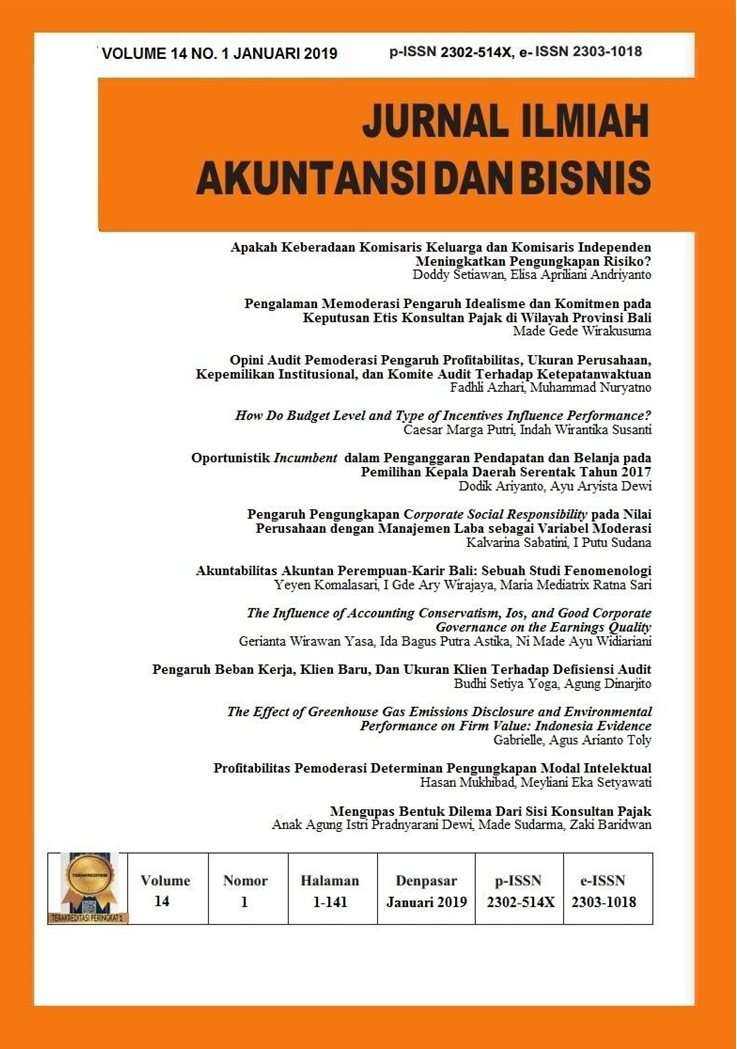Pengalaman Memoderasi Pengaruh Idealisme dan Komitmen pada Keputusan Etis Konsultan Pajak di Wilayah Provinsi Bali
Abstract
Tax consultants are indispensable as associates of the Direktorat Jendral Pajak to help in raising awareness about the importance of taxpayer compliance. This study aims to determine the influence of experience on the relationship between idealism and professional commitment to ethical decision-making by tax consultants. The questionnaires were sent to the respondents/sample (members of Ikatan Konsultan Pajak Indonesia [IKPI]) of Bali Province. The sample was determined using the purposive sampling technique. Ninety questionnaires from 109 respondents working as tax consultants in Bali Province were collected as a pilot research, with a useable response rate of 84.1%. The results of the moderated regression analysis (MRA) analysis demonstrate that experience reinforces the positive influence of the relationship between idealism and ethical decisions of tax consultants, while it has no effect on the relationship between professional commitment and ethical decision-making by tax consultants in Bali Province.
Keywords: ethical decision, idealism, professional commitment, experience
Downloads
References
Achmad, T. 2014. Menjadikan Konsultan Pajak sebagai Agents of Tax Compliance. Website: http://www. pajak.go.id/ content/article/menjadikan-konsultan-pajak-sebagai-agents-taxcompliance.
Ashari, 2013.Corruption Awareness, Ethical Sensitivity, Professional Skepticism And Risk Of Corruption Assessment: Exploring The Multiple Relationship In Indonesian Case. Availablefrom: www.ssrn.com.
Aziza, N. dan Salim A. 2007.Pengaruh Orientasi Etika Pada Komitmen dan Sensitivitas Etika Auditor (Studi Empiris pada Auditor di Bengkulu dan Sumatera Selatan).Simposium Nasional Akuntansi XI. Pontianak 23 – 24 Juli 2008.
Blanthorne, C., H. A. Burton dan Fisher, D. 2014.The Aggressiveness of Tax Professional Reporting: Examining the Influence of Moral Reasoning. Advances in Accounting Behavioral Research, 16, 149 – 181.
Brooks, Leonard J. 2007. Business and Professional Ethics. ThompsonSouth Western.
Devos, K. 2012. The Impact of Tax Professionals Upon the Compliance Behavior of Australian Individual Taxpayers, Revenue Law Journal, 22 (1), 1-26.
Fallah, Syaikhul. 2006. “Pengaruh Budaya Etis Organisasi Dan Orientasi Etika Terhadap Sensitivitas Etika (Studi Empiris Tentang Pemeriksa Internal di Bawasda Pemda Papua)” (tesis). Semarang: Universitas Diponegoro.
Forsyth, D. R. 1980. A Taxonomy of Ethical Ideology. Journal of Personality andSocial Psychology.Vol. 39, pp. 175-184.
Gusnardi. 2003. Analisis Perbandingan Faktor-faktor yang Mempengaruhi Judgment Penetapan Risiko Audit oleh Auditor yang Berpengalaman dan Auditor yang Belum Berpengalaman. Tesis Tidak terpublikasi, Bandung: Universitas Padjadjaran
Gusti, M. dan Syahril, Ali. 2007. Hubungan Skeptisisme Profesional Auditor Dan Situasi Audit, Etika, Pengalaman Serta Keahlian Audit Dengan Ketepatan Pemberian Opini Auditor Oleh Akuntan Publik.Simposium Nasional Akuntansi XI. Pontianak 23 – 24 Juli 2008.
Higgins and Kelleher. 2005. Comparative Perspectives on the EthicalOrientations of Human Resources, Marketing and Finance Functional Managers. Journal of Business Ethics. Vol.56, pp. 275-288.
Januarti, Indira. 2011. Analisis pengaruh pengalaman auditor, komitmen profesional, orientasi etis, dan nilai etika terhadap persepsi dan pertimbangan etis (auditor badan pemeriksa keuangan Indonesia). Simposium Nasional Akuntansi XIV.Aceh 20 – 23 Juli 2011.
Jones, T. M. 1991. Ethical Decision Making by Individuals in Organizations : AnIssue Contingent Model. Academy of Management Review.Vol. 16, pp. 366-395.
Jeffrey, C. and Weatherholt, N. 1996.Ethical Development, ProfessionalCommitment, and Rule Observance Attitudes: A Study Case of CPAs and Corporate Accountans. Behavioral Research in Accounting. Vol.8, pp. 8-36.
Kohlberg, L. 1969. Stage and Sequance: The Cognitive Developmental Approachto Socialization in D.A Goslin. Chicago: Rand McNally.Handbook of Socialization Theory and Research.pp. 347-480.
Kwon, I. W. G., and Banks, D. W. 2004.Factors Related To The Organizational AndProfessional Commitment Of Internal Auditors.Managerial Auditing Journal.Vol.19, pp.606–622.
Larkin, J. M. 1990.Does Gender Affect Auditor KAPs’ Performance?.TheWoman CPA. Spring pp. 20-24.
Peraturan Menteri Keuangan Republik Indonesia Nomor 111/PMK.03/2014 Tentang Konsultan Pajak.
Shaub, M. K., Don, W. Finn and Paul, Munter. 1993. The Effects of Auditor’sEthical Orientation on Commitment and Ethical Sensitivity.Behavioral Research in Accounting. Vol. 5, pp. 145-169.
Sugiyono. 2010. Metode Penelitian Bisnis Kuantitatif, Kualitatif dan R&D. Bandung: PT. Alfabeta Cipta.
Trevino, Linda Klebe. 1986. Ethical Decision Making in Organization: A PersonSituation Interactionist Model. Academy of Management Review Review. pp.601-617.
Uyar,M., and Ozer, G. 2011. The Ethical Orientation And Professional Commitment: An Empirical Examination On Turkish Accountants. Availablefrom: www.ssrn.com.
Kementrian Keuangan. www.kemenkeu.go.id/Berita/menkeu-tax-ratio-indonesia-di-bawah-standar. diunduh 19 Januari 2017.




















